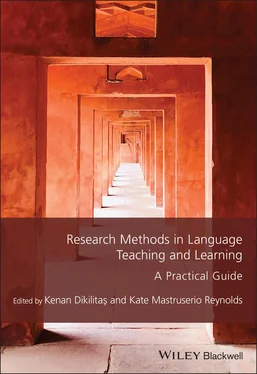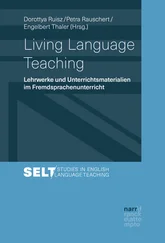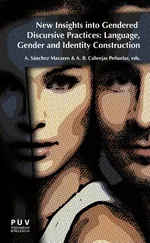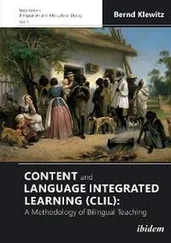Research Methods in Language Teaching and Learning
Здесь есть возможность читать онлайн «Research Methods in Language Teaching and Learning» — ознакомительный отрывок электронной книги совершенно бесплатно, а после прочтения отрывка купить полную версию. В некоторых случаях можно слушать аудио, скачать через торрент в формате fb2 и присутствует краткое содержание. Жанр: unrecognised, на английском языке. Описание произведения, (предисловие) а так же отзывы посетителей доступны на портале библиотеки ЛибКат.
- Название:Research Methods in Language Teaching and Learning
- Автор:
- Жанр:
- Год:неизвестен
- ISBN:нет данных
- Рейтинг книги:5 / 5. Голосов: 1
-
Избранное:Добавить в избранное
- Отзывы:
-
Ваша оценка:
- 100
- 1
- 2
- 3
- 4
- 5
Research Methods in Language Teaching and Learning: краткое содержание, описание и аннотация
Предлагаем к чтению аннотацию, описание, краткое содержание или предисловие (зависит от того, что написал сам автор книги «Research Methods in Language Teaching and Learning»). Если вы не нашли необходимую информацию о книге — напишите в комментариях, мы постараемся отыскать её.
Research Methods in Language Teaching and Learning
Research Methods in Language Teaching and Learning
Research Methods in Language Teaching and Learning — читать онлайн ознакомительный отрывок
Ниже представлен текст книги, разбитый по страницам. Система сохранения места последней прочитанной страницы, позволяет с удобством читать онлайн бесплатно книгу «Research Methods in Language Teaching and Learning», без необходимости каждый раз заново искать на чём Вы остановились. Поставьте закладку, и сможете в любой момент перейти на страницу, на которой закончили чтение.
Интервал:
Закладка:
27 Lincoln, Y., & Guba, E. (1985). Naturalistic inquiry. Sage.
28 Milner, H. R., & Woolfolk Hoy, A. (2003). A case study of an African American teacher’s self-efficacy, stereotype threat, and persistence. Teaching and Teacher Education, 19(2), 263–276. https://doi.org/10.1016/S0742-051X(02)00099-9
29 Mulholland, J., & Wallace, J. (2001). Teacher induction and elementary science teaching: Enhancing self-efficacy. Teaching and Teacher Education, 17(2), 243–261. https://doi.org/10.1016/S0742-051X(00)00054-8
30 Nisbet, J., & Watt, J. (1984). Case study. In J. Bell, T. Bush, & A. Fox (Eds.), Conducting small-scale investigations in educational management (pp. 79–92). Harper & Row.
31 Phan, N. T. T. (2015). Can I teach these students? A case study of Vietnamese teachers’ self-efficacy in relation to teaching English as a foreign language. Unpublished PhD dissertation. The University of Waikato, New Zealand.
32 Pintrich, P. R., & Schunk, D. H. (1996). Motivation in education: Theory, research, and applications. Prentice Hall.
33 Robson, C. (2002). Real world research (2nd ed.). Blackwell.
34 Rushton, S. P. (2003). Two preservice teachers’ growth in self-efficacy while teaching in an inner-city school. The Urban Review, 35(3), 167–189. https://link.springer.com/article/10.1023/A:1025788102188
35 Silverman, D. (2010). Doing qualitative research (3rd ed.). Sage.
36 Stake, R. E. (1995). The art of case study research. Sage.
37 Tschannen-Moran, M., & Woolfolk Hoy, A. (2001). Teacher efficacy: Capturing an elusive construct. Teaching and Teacher Education, 17(7), 783–805. https://doi.org/10.1016/S0742-051X(01)00036-1
38 Tschannen-Moran, M., Woolfolk Hoy, A., & Hoy, W. K. (1998). Teacher efficacy: Its meaning and measure. Review of Educational Research, 68(2), 202–248. https://doi.org/10.3102%2F00346543068002202
39 Wheatley, K. F. (2002). The potential benefits of teacher efficacy doubts for educational reform. Teaching and Teacher Education, 18(1), 5–22. https://doi.org/10.1016/S0742-051X(01)00047-6
40 Wheatley, K. F. (2005). The case for reconceptualizing teacher efficacy research. Teaching and Teacher Education, 21(7), 747–766. https://doi.org/10.1016/j.tate.2005.05.009
41 Wyatt, M. (2000). Making success more likely: Using learner training to build expectancy and self-efficacy beliefs. Unpublished master’s dissertation. University of Edinburgh.
42 Wyatt, M. (2008). Growth in practical knowledge and teachers’ self-efficacy during an in-service BA (TESOL) Programme. Unpublished PhD dissertation. University of Leeds, UK.
43 Wyatt, M. (2009). Practical knowledge growth in communicative language teaching. TESL-EJ, 13(2), 1–23. https://eric.ed.gov/?id=EJ898199
44 Wyatt, M. (2010a). One teacher’s development as a reflective practitioner. Asian EFL Journal, 12(2), 235–261. https://core.ac.uk/download/pdf/52392042.pdf#page=235
45 Wyatt, M. (2010b). An English teacher’s developing self-efficacy beliefs in using group work. System, 38(4), 603–613. https://doi.org/10.1016/j.system.2010.09.012
46 Wyatt, M. (2011a). Becoming a do-it-yourself designer of English language teaching materials. Forum Qualitative Sozialforschung/Forum: Qualitative Social Research, 12 (1), Art 33, 1–38. https://doi.org/10.17169/fqs-12.1.1533
47 Wyatt, M. (2011b). Teachers researching their own practice. ELT Journal, 65(4), 417–425. https://doi.org/10.1093/elt/ccq074
48 Wyatt, M. (2012). Issues in supporting the teaching of reading in English as a second language to Arabic-speaking children. The Reading Matrix, 12(2), 146–162. https://core.ac.uk/download/pdf/52397495.pdf
49 Wyatt, M. (2013a). Overcoming low self-efficacy beliefs in teaching English to young learners. International Journal of Qualitative Studies in Education, 26(2), 238–255. https://doi.org/10.1080/09518398.2011.605082
50 Wyatt, M. (2013b). Motivating teachers in the developing world: Insights from research with English language teachers in Oman. International Review of Education, 59(2), 217–242. https://link.springer.com/article/10.1007/s11159-013-9358-0
51 Wyatt, M. (2014). Towards a re-conceptualization of teachers’ self-efficacy beliefs: Tackling enduring problems with the quantitative research and moving on. International Journal of Research and Method in Education, 37(2), 166–189. https://doi.org/10.1080/1743727X.2012.742050
52 Wyatt, M. (2015). Using qualitative research methods to assess the degree of fit between teachers’ reported self-efficacy beliefs and their practical knowledge during teacher education. Australian Journal of Teacher Education, 40 (1), Art 7, 1–30. http://dx.doi.org/10.14221/ajte.2015v40n1.7
53 Wyatt, M. (2016). “Are they becoming more reflective and/or efficacious?” A conceptual model mapping how teachers’ self-efficacy beliefs might grow. Educational Review, 68(1), 114–137. https://doi.org/10.1080/00131911.2015.1058754
54 Wyatt, M. (2018a). Language teachers’ self-efficacy beliefs: An introduction. In S. Mercer, & A. Kostoulas (Eds.), Language teacher psychology (pp. 122–140). Multilingual Matters.
55 Wyatt, M. (2018b). Language teachers’ self-efficacy beliefs: A review of the literature (2005–2016). Australian Journal of Teacher Education, 43(4), 92–120. https://ro.ecu.edu.au/ajte/vol43/iss4/6/
56 Wyatt, M., & Arnold, E. (2012). Video-stimulated recall for mentoring in Omani schools. International Journal of Mentoring and Coaching in Education, 1(3), 218–234. https://doi.org/10.1108/20466851211279475
57 Wyatt, M., & Borg, S. (2011). Development in the practical knowledge of language teachers: A comparative study of three teachers designing and using communicative tasks on an in-service BA TESOL programme in the Middle East. Innovation in Language Learning and Teaching, 5(3), 233–252. https://doi.org/10.1080/17501229.2010.537340
58 Wyatt, M., & Dikilitaş, K. (2019). English language teachers’ self-efficacy beliefs for grammar instruction: Implications for teacher educators. The Language Learning Journal. Advance access, first published online 26/07/19. https://doi.org/10.1080/09571736.2019.1642943
59 Yin, R. (1994). Case study research: Design and methods. Sage.
2 Researching the Language Classroom Through Ethnographic Diaries: Principles, Possibilities, and Practices
Graham Hall
Introduction
Contextualizing the Research
The classroom, notes Wright, “is the true centre of educational experience … it is here, through the teaching-and-learning process, that education ‘happens’” (2005, p. 1). And, although the work of an English language teacher comprises many elements and activities – for example, lesson preparation, training and continuing professional development, setting and marking assessments, developing materials, and report writing – the classroom is, for most, “the crucible” of our professional lives (Gaies, 1980).
This was certainly true for myself as I started out as an English language teacher in the early 1990s. Yet it was soon evident that the care with which I planned my lessons, carefully trying to anticipate potential pitfalls and problems in order that a session’s aims and objectives could be achieved and language could be learned, did not relate in straightforward ways to what happened in the classroom. For example, teaching the same or similar material to two different classes would often lead to differences in the way the learners engaged with the lesson content and with each other in class, and in the language they seemed to remember and/or learn; some classes seemed to go well, some less so. And even after significant reflection, I often could not quite understand why this was.
Of course, every teacher encounters similar issues, of why some lessons “work” but others do not; “common sense” tells us that this is just part of the life of a teacher. However, it was while studying for an MA in English language teaching (ELT) at Lancaster University a few years into my teaching career that I first encountered ideas and conceptualizations of the language classroom that started to make sense of it all. Not only is the classroom a place (either physical or online) where “typically, one teacher and a number of learners come together for a pedagogical purpose” (Allwright, 1992, p. 267; emphasis added), classrooms are also social environments (Tudor, 2001). From this perspective, classrooms have their own complex social cultures (Breen, 2001), which are shaped by, and shape, teachers and learners. A language class is thus:
Читать дальшеИнтервал:
Закладка:
Похожие книги на «Research Methods in Language Teaching and Learning»
Представляем Вашему вниманию похожие книги на «Research Methods in Language Teaching and Learning» списком для выбора. Мы отобрали схожую по названию и смыслу литературу в надежде предоставить читателям больше вариантов отыскать новые, интересные, ещё непрочитанные произведения.
Обсуждение, отзывы о книге «Research Methods in Language Teaching and Learning» и просто собственные мнения читателей. Оставьте ваши комментарии, напишите, что Вы думаете о произведении, его смысле или главных героях. Укажите что конкретно понравилось, а что нет, и почему Вы так считаете.












